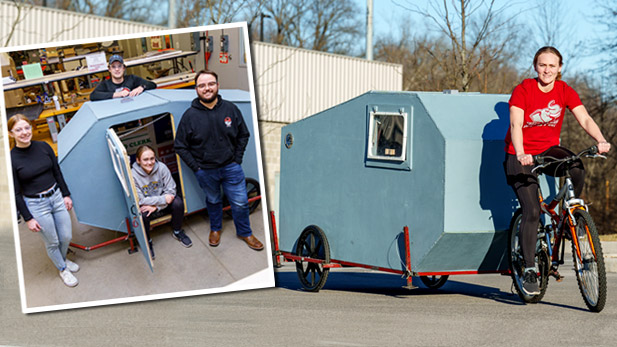Mechanical Engineering Seniors’ Recyclable Ideas Could Provide Homeless with 'Shelter on Wheels'

Using recyclable and upcycled materials, Rose-Hulman seniors Therese Jaeger, Garrett Janning, Patrick Kelly, and Lane Lawrence developed a prototype project that could provide convenient mobile shelters for homeless individuals.
Recycled materials are getting a new sustainable purpose with the possibility of providing homeless individuals with portable shelters, offering short-term housing until that person can move into a more permanent setting.
That’s the principle behind a senior-year capstone project designed and constructed this school year by four mechanical engineering students – bringing a local client’s ideas into the development of a prototype mobile homeless shelter that may someday be replicated into a nationwide initiative.
The Sheltering Homeless on Wheels project is a trailer that can be pulled behind a bicycle so that homeless can transport groceries from the market. It can be detached and provide shelter to secure an individual’s belongings, and provide a safe, warm and dry space to rest.
Terre Haute resident Garri Knezevich came up with the project’s idea several years ago after learning about the plight of local homeless people having tents and belongings repeatedly stolen. Keeping costs inexpensive, he thought about using recyclable or upcycled materials through reTHink Inc., a local non-profit organization that’s creating a cleaner, greener community through several sustainable programs.
Associate Professor Rebecca Bercich, PhD, is reTHink’s board president and director of the center’s upcycling workspace. She also is one of the faculty mentors for Rose-Hulman’s mechanical engineering capstone design program, which has student teams spending their senior year applying their problem-solving skills to design, fabricate, test, and get critical feedback on an hands-on project for an external client.
“This project was a positive experience for our students, reTHink and most importantly the client and the homeless people who could be impacted,” said Bercich. “We pitched the idea to the students and there was a very positive response.”
Undertaking different aspects of the projects were students Therese Jaeger, Garrett Janning, Patrick Kelly, and Lane Lawrence.
The group used discarded political campaign yard signs to help insulate the plywood shelter interior walls, added carpet remnants with foam padding to make the floor comfortable. They also welded together donated metal to form the trailer’s frame and hitch, and built windows using plastic partitions that were used during the COVID-19 pandemic. The students added battery-powered lighting to create an even more comfortable atmosphere, and applied an inexpensive sealant to help weatherize the structure. The cost of materials for the prototype is estimated at approximately $550.
“Our goal from the start was to make an impact in someone’s life,” said Lawrence. “We were passionate about this project from Day 1. We feel good about using our engineering skills to make a difference.”
Jaeger referred to the project as “a labor of love” for the team. “The more we worked on it, the more excited we were about it and its prospects.”
Janning added, “This was my No. 1 choice (capstone project). My whole thing for engineering is, I want to have a job where I make people safer. With the different projects, this seemed like the one that would help people the most and it has the biggest impact on someone’s personal safety.”
As part of the design and testing process, students had to consider several issues regarding structural integrity, stability and different loading scenarios. Other critical challenges include the bicycle’s maneuverability with the attached trailer, comfort for an inhabitant, and long-term project sustainability.
The student team received feedback on its initial prototype and are currently making modifications to the frame and hitch.
“Of course, there will be some modifications. However, the priorities that I gave the team have been pretty much achieved,” Knezevich said. “Rose-Hulman has been a godsend on this. This has been an idea that I have had for eight or seven years. The students have made it a reality … In working with the homeless, this has the potential for saving lives.”
Grants could help put 10 trailers to use within the community by the end of the year, according to Knezevich. Eventually the project idea could be spread statewide, then nationwide. Bercich hopes featuring recyclable and upcycled materials will continue to be a key part of any future initiative.
“This is just the blueprint for what’s possible for this and so many other projects like this,” said the mechanical engineering professor. “As with any project, our students took an idea, worked within a variety of constraints and came up with a useful product to meet a client’s needs.”